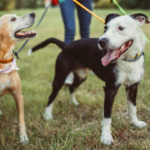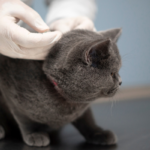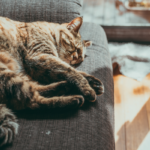Would you believe that the grainy tanned coloured grit in the fingers of the glove pictured above is sand extracted from a horse’s stomach? It is good for horses to graze and eat off the ground for the sake of maintaining normal dental health and tooth wear, but for horses on the Northern Beaches this poses a particular risk of the ingestion of
sand.
Sand colic is abdominal pain due to the ingestion of sand. While most horses inadvertently have some sand within their digestive system through their normal feeding habits, some horses are more prone to sand colic than others, even when sharing the same environment.
Sand is very abrasive and eventually becomes a constant source of irritation. This persistent inflammatory insult reduces the absorptive efficiency of the bowel so it is no surprise that diarrhoea, anorexia, weight loss and depression are often clinical features in affected horses. When present, diarrhoea may occur intermittently, or the manure may be constantly loose. Affected horses typically have loose, dark and sometimes sandy manure which may precede a colic episode.
Early signs of sand colic or sand irritation can include symptoms associated with diarrhoea and abdominal pain (abdomen watching, pawing at the ground or lying down).
Over time, ingested sand can become considerable, tending to accumulate in the large colon. This can lead to impaction or obstruction. Significant sand accumulation will disrupt normal intestine peristaltic movements which can then predispose the bowel to displacements or torsions, accompanied by severe pain.
Treatment for sand colic includes repeated nasogastric administration of lubricants to disrupt the obstructing mass, pain relief and reduction of the intestinal inflammation and prevention of recurrence. Surgical intervention is recommended in horses that have failed to respond to medical therapy within 48-72 hours. Surgery is also
recommended in cases consistent with the presence of intestinal displacement or torsion.
As a preventative measure, we recommend that owners give their horse one cup of psyllium husk (250g) twice a day, for one week every month, or a treatment of sandlube. We can also provide faecal checks for sand and worms, if owners bring in a sample of faeces to the clinic.
If you suspect that your horse may have sand colic, please call us today.





